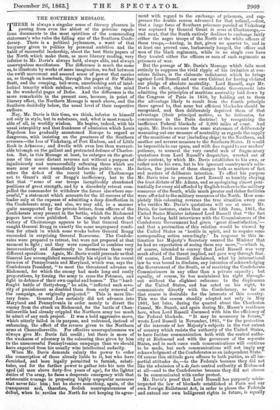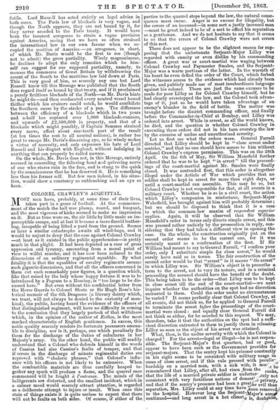THE SOUTHERN MESSAGE.
THERE is always a singular sense of literary pleasure in passing from even the ablest of the genuine repub- lican documents to the most spiritless of the commanding statesman's who rules the falling star of the Southern Confe- deracy. There is a political joylessness, a want of that buoyancy given to politics by personal ambition and the habit of successful leadership, about the best State papers of the North which make them, as mere literary reading, very inferior to Mr. Davis's always bold, always able, and always unscrupulous manifestoes. The difference is much the same as, to illustrate by works of mere imagination, we feel between the swift movement and assured sense of power that carries us, as though on horseback, through the pages of Sir Walter Scott, and the creeping, toil-worn, unrefreshing sort of intel- lectual tenacity which subdues, without relaxing, the mind in the wonderful pages of Defoe. And the difference is the more remarkable in the present case, because, in point of literary effect, the Northern Message is much above, and the Southern decidedly below, the usual level of their respective authors.
Nay, Mr. Davis is this time, we think, inferior to himself not only in style, but in substance and, what is most remark- able of all, in worldly wisdom. He begins, indeed, with his usual intrepidity and that frankness of admission which Louis Napoleon has gradually accustomed Europe to regard as dangerous, with insisting on the greatness of the Southern reverses—the loss of Vicksburg, of Port Hudson, and of Little Rock in Arkansas ; and dwells with even less than warrant- able triumph on the gallant and protracted defence of Charles- ton. But, in this Message at least, he enlarges on the great- ness of the more distant reverses not without a purpose of injudiciously and unsuccessfully softening those which are more near or more immediately before the public eye. He refers the defeat of the recent battle of Chattanooga not to Grant's skill or Bragg's inefficiency, but to the fact that "some of our troops inexplicably abandoned positions of great strength, and by a disorderly retreat com- pelled the commander to withdraw the forces elsewhere suc- cessful," a statement which accounts for the ill-success of the leader only at the expense of admitting a deep disaffection in the Confederate army, and also, we may add, in a manner quite unsupported by the private letters, from officers of the Confederate army present in the battle, which the Richmond papers have since published. The simple truth about the victory of Chattanooga appears to be that General Grant caught General Bragg in exactly the same unprepared condi- tiog for attack in which some weeks before General Bragg succeeded in surprising General Rosecranz. The Confede- rates were prepared to retreat, but were not prepared at that moment to fight; and they were compelled to combine very inconveniently and disastrously to themselves those very different operations. Again, Mr. Davis would persuade us that General Lee accomplished successfully his object in the recent invasion of Pennsylvania and Maryland, which was, says the Confederate President, "to meet the threatened advance on Richmond, for which the enemy had made long and costly preparations, by forcing the army to cross the Potomac, and tight in defence of their own capital and homes." The "hard- fought battle of Gettysburg," he adds, "indicted such seve- rity of punishment as disabled them from i early renewal of the campaign, as originally projected." This s mere lite- rary fence. General Lee certainly did not advance into Maryland and Pennsylvania in order merely to divert the enemy from the attack on Richmond, for the battle of Chan- cellorsville had already crippled the Northern army too much to admit of any such project. It was a bold aggressive move, which utterly failed in its purpose, and redressed, instead of enhancing, the effect of the reverse given to the Northern arms at Chaneellorsville. For effective unscrupulousness we always give Mr. Davis fall credit ; but there is more of the weakness of advocacy in the colouring thus given by him to the unsuccessful Pennsylvanian campaign than we should have expected from his usually wise intellectual audacity. When Mr. Davis demands calmly the power to order the conscription of those already liable to it, but who have furnished, and been legally permitted to furnish, substi- tutes, and for the further power to gather into his nets the aged (all men above forty-five years of age), for the lighter duties of Vie army, he faces a desperate emergency with that aristocratic courage in proposing highly unpopular measures that never faii him • but he shows something, again, of the tnansparent and,therefore, foolish unscrupulousness of defeat, when ht. reviles the North for not keeping its agree- ment with regard to the exchange of prisoners, and sup- presses the double reason advanced for that refusal,—first, that a large force of Southern prisoners paroled at Vicksburg was captured by General Grant in arms at Chattanooga,— and next, that the South entirely declines to exchange fairly either the negro troops of the North or the white officers of those troops,—having, in fact, given no quarter to, and in at least one proved ease, barbarously hanged, the officer and men of the black regiments, while in no single case have they treated either the officers or men of such regiments as prisoners of war.
But the passage of Mr. Davis's Message which fails most entirely to suppress the vivid ripple of his irritation at con- scious failure, is the elaborate indictment which he brings against Lord Russell and our own Cabinet for having violated our pledge of absolute neutrality. Lord Russell, says Mr. Davis in effect, cheated the Confederate Government into admitting the principles of maritime neutrality laid down by the Congress of Paris in 1856, by holding out to them the advantage likely to result from the fourth principle there agreed to, that none but efficient blockades should be recognized, and then deliberately deprived them of that advantage (their principal motive, as he intimates, for concurrence in the Paris doctrine) by recognizing the inefficient Federal blockade of 3,000 miles of coast. And again, Mr. Davis accuses the same statesman of deliberately measuring out one measure of neutrality as regards the supply of the munitions of war (including ships) to the Northern, and another and severer measure to the Southern States. It would be impossible in our space, and with due regard to our readers' patience, to unravel the very careful web of fragmentary quotations from Lord Russell's despatches, wrested out of their context, by which Mr. Davis establishes to his own, or rather not to his own, but to his ignorant countrymen's satis- faction, the justice of these charges both as matters of fact and, matters of deliberate intention. To effect his purpose Mr. Davis tries to present Lord Russell as humbly obeying the least dictate of Mr. Adams, and as apologizing almost peni- tentially for every aid afforded by English traders to the military resources of the South, while much greater and richer facilities were afforded to the military resources of the North. How com- pletely this colouring reverses the true situation every one who verifies Mr. Davis's quotations will see at once. Mr. Davis, for instance, states that on the 12th lune, 1861, the United States Minister informed Lord Russell that "the fact of his having held interviews with the Commissioners of the Confederate Government had given great dissatisfaction,'— and that a protraction of this relation would be viewed by the United States as hostile in spirit, and to require some corresponding action accordingly.' In response to this in- timation her Majesty's Secretary assured the Minister that he had no expectation of seeing them any more,"—which is, of course, intended to convey that Lord Russell was very much afraid of the threat implied, and gave way through fear. Of course, Lord Russell disclaimed, what by international law he was bound to disclaim, any intention of acknowledging the Government of the South, or of receiving the Confederate Commissioners in any other than a private capacity ; but equally, of coarse, he has maintained his right through- out without the slightest reference to the displeasure of the United States, and has acted on his right, to communicate directly with the Confederacy, so far as that course is desirable for the interests of this country. This was the course steadily adopted not only in May 1861, but later, during the quarrel about the Charleston Consul, Mr. Bunch, and again during Mr. Mason's residence here, when Lord Russell discussed with him the efficiency of the Federal blockade. "It may be necessary in future," wrote Lord Russell in November, 1861, "for the protection of the interests of her Majesty's subjects in the vast extent of country which resists the authority of the United States, to have further communication both with the central autho- rity at Richmond and with the governors of the separate States, and in such eases such communications will continue to be made, but such communications will not imply any acknowledgment of the Confederates as an independent State.' Of course this attitude gave offence to both parties, as all im- partial attitudes do,—to the Federals because they did not like the admission of a de facto central authority at Richmond at all—and to the Confederates because they did not choose to be communicated with under protest. Mr. Davis's proof that Lord Russell has purposely misin- terpreted the law of blockade established at Paris and our own Foreign Enlistment Act, in order to please the Federals and extend our own belligerent rights in future, is equally futile. Lord Russell has acted strictly on legal advice in both cases. The Paris law of blockade is very vague, and though the North approve, they are not bound by it, for they never acceded to the Paris treaty. It would have been the insanest arrogance to strain a vague provision against America, seeing that wo have so often strained the international law in our own favour when we oc- cupied the position of America —an arrogance, in short, of which Mr. Davis would be the first to see (though not to admit) the gross partiality. Wisely magnanimous, he declines to adopt the only remedies which he him- self can suggest for our supposed partiality, namely, to menace the commerce of Great Britain by withdrawing the assent of the South to the maritime law laid down at Paris. This is very good of him, as scarcely any one but Lord Russell knew till this Message was published that the South does regard itself as bound by that treaty, and if it proclaimed a purely fictitious blockade of the North—as Mr. Davis hints he might do—and then confiscated every neutral vessel bound thither which his cruisers could catch, he would annihilate the Southern cause by the stroke of a pen. The difference between the efficiency of a blockade which in two years and a-half has captured over 1,000 blockade-runners, and upwards of £2,500,000 in property, and that of a blockade which might possibly, if Captain Semmes strained every nerve, effect about one-tenth part of the result (at ten times the cost to all neutral nations), is rather too great to escape Mr. Davis's discerning eye, so he wisely makes a virtue of necessity, and only expresses his hate of Lord Russell and his disgust with England, without indulging in anything that can properly be called menace.
On the whole, Mr. Davis does not, in this Message, entirely succeed in concealing the faltering hand and quivering nerve of one who stares ruin in the face, and is stung to the quick by the consciousness that he has deserved it. He is something less than his former self. But few men indeed, in his situa- tion, would show a constancy so unblenching and an eye so keen. '































 Previous page
Previous page